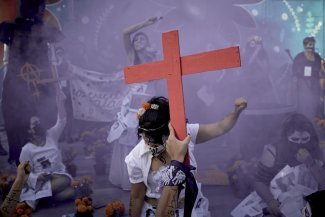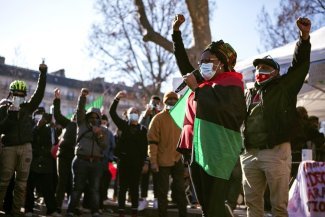Keo Samoeun has helped construct dozens of buildings throughout Phnom Penh. In the past, he repaired villas damaged during the Khmer Rouge era and he is currently working on a Cao Dai temple, where he also practices the religion from Vietnam. However, the walls he builds have a sturdier foundation in Phnom Penh than the bricklayer himself, who has Cambodian and Vietnamese heritage but no official, permanent identification in either nation.
Amid decades of shifting borders and intertwined histories, tens of thousands of Cambodian citizens claim some degree of Vietnamese heritage. But the Cambodian government is stripping many of these people of their citizenship, playing into deeply-rooted social conflicts between the two nations.
At the end of last year, ahead of national elections this July, the Cambodian government embarked on a campaign to silence opposition leaders, dismantle independent media and disengage from civil society-led pro-democracy efforts, stemming from Prime Minister Hun Sen’s dubious warnings that opposing parties and foreign NGOs are cultivating a violent overthrow of the government.
Among these crackdowns, the Immigration Department began to revoke what it described as “improper” identification documents from more than 70,000 people, mostly of Vietnamese origin.
According to VNExpress news, over 1880 undocumented people (including some ethnic Chinese) were deported in 2017.
There is no clear estimate on the number of people of Vietnamese origin living in Cambodia nor how many have officially obtained Cambodian citizenship, but many of those who were not born in the country maintain they have lived in Cambodia for decades, according to a 2013 report by the Jesuit Refugee Service Cambodia on the legal status of Cambodia’s ethnic Vietnamese minority population.
The recent document purges started in December 2017 in Kampong Chhnang province in central Cambodia, where thousands of ethnic Vietnamese live along and on the Tonlé Sap lake. It then spread to Phnom Penh, specifically targeting areas with large Vietnamese populations.
The Cambodian government, which did not respond to multiple requests for comment, stated earlier this year that any ethnic Vietnamese person who is currently facing deportation will be granted a two-year residency card if they can prove they have lived in Cambodia since at least 2012. In theory, such residents will then be able to apply for citizenship after seven years.
However, the documentation purge forges a paradox for Vietnamese-Cambodians: they lose permanent legal status they previously had in Cambodia because of their Vietnamese heritage, but the Vietnamese government will not give them legal status either because they cannot prove their eligibility.
Number of stateless individuals growing
As he waited for a new passenger in the Chbar Ampov district of Phnom Pehn, 62-year-old motorbike driver Thanh Kim Heng warned of a nearby alley street where police often patrol the neighbourhood in an attempt to draw out those who might still have documents. They already confiscated his national ID in exchange for a foreign ID several weeks ago, and other officers have stopped him in the street to pull a bribe out of him, threatening him with arrest.
“If you talk, you’re in trouble,” Thanh said. “You can’t talk or argue with them [the police].”
Gaining identification has been a long struggle for Cambodia’s ethnic Vietnamese population, primarily in poorer regions in the provinces, says Sourn Butmao, executive director of the Minority Rights Organization (MIRO).
Now without documents, long-time neighbours in Phnom Penh’s Choam Chao commune are living in fear of the future.
Though officials have said that ethnic Vietnamese will “volunteer to go back,” that’s not an option for Vong. The 31-year-old was born in Cambodia and held a national ID card for as long as she can remember. She’s fluent in written and spoken Khmer, but her parents’ Vietnamese heritage was all that immigration officials cared about when they confiscated her documents at the beginning of the year.
“Even though I speak Khmer, the people in the government say I’m just Vietnamese,” she told Equal Times. Before immigration officials confiscated her ID documents, Vong was planning to sell her one-room home. Now those plans are on hold. Foreigners are not allowed to own land in Cambodia, so legally, she would make no money from the sale.
Vong received some respite last month when her daughter’s school accepted a photocopy of the family book identifying her children, which Vong filed away before officials announced plans to revoke it. But she fears the school could require a formal ID document in the future.
“I’m not as concerned about myself, but what about my child?” she asked. “How am I going to make an ID for my child?”
Stoking fears
The history between Cambodia and Vietnam is complicated, but in its most condensed form, anti-Vietnamese sentiment was born out of threats to the Cambodian empire from Vietnam, as well as Thailand, in the late 19th and early 20th centuries. For decades afterwards, Vietnam became Cambodia’s primary antagonist in many minds, as French colonizers employed the Vietnamese as administrators within Cambodia, and again when Vietnamese forces exerted control over the country in the fallout of the genocidal Khmer Rouge regime from 1978 until the late 1980s.
In recent elections, politicians from all sides have weaved these ethnic tensions into their platforms. Former opposition leader and head of the populist Cambodia National Rescue Party (CNRP) Sam Rainsy often rallied against a Vietnamese invasion of Cambodia to get at Prime Minister Hun Sen, who was installed as foreign minister by the Vietnamese in 1979 as the Khmer Rouge retreated. Hun Sen assumed the role as prime minister in 1985, which currently makes him one of the world’s longest serving leaders.
As competition peaked in the 2013 national election, the outspoken critic of the ruling party played into fears that Vietnam will overtake the country: “Four or five years more is too late, Cambodia will be full of Vietnamese,” said Sam. “We will become slaves of Vietnam.”
Now that a new national election approaches on 29 July, Hun Sen has turned accusations of collusion with Vietnam back on his adversary, ordering an investigation into possible treason following Sam’s 2013 statements that he would give autonomy to Montagnards, an indigenous group of Vietnamese heritage living in Cambodia’s north-eastern provinces.
Though he thinks the documentation purge is partially an attempt to address Cambodia’s notoriously lax borders, Sourn also believes the ruling party is implicitly trying to show that they are aligned with Cambodian citizens, while attracting some of the CNRP supporters who clamped onto the opposition’s anti-Vietnamese sentiment.
“Politicians always renew these cases [of discrimination], creating new ones for the people,” Sourn said. “Some people may forget, but if politicians talk about it again, they recall the old conflicts.”
Past and present identities overlap
Vietnamese and Cambodian identities are as complicated and intertwined as the two nations’ histories, so attempts to distinguish Cambodian from Vietnamese often turn contradictory.
With Vietnamese names and Cambodian ancestors, the Khmer Krom, or “Cambodians from the south,” confound enforcement. A minority population from a region of Vietnam that was originally a part of the Cambodian empire, legally the Khmer Krom have a right to Cambodian citizenship without proving how long they have lived in the country.
However, the Khmer Krom community often face discrimination when applying for legal documents, with immigration officials stalling the process.
According to MIRO’s Sourn, about 30 per cent of Khmer Krom have no documentation in Cambodia, often because they either fear the process or do not wish to comply with officials’ demands.
“Their family names are different, so local authorities always ask them to change, but if they change names it means they will lose their identity,” he said.
Tucked behind an electronics shop playing loud techno music, the elderly Khmer Krom bricklayer Keo feels comfortable talking about his immigrant status within the confines of the temple. Keo knows that legally he is fully eligible for Cambodian citizenship, but each time that he applies he is told that a two-year residency card is his only option.
Outside, he’s called a “foreigner” and “yuon,” a derogatory word for Vietnamese people, even though he has spent decades in Cambodia. His 12-year-old grandson Sokha interjects with his own experience with discrimination; at school, his some of his classmates regurgitate centuries-old prejudice, telling Sokha that “the Vietnamese are just coming here to take over our land.”
Keo told Equal Times that many Cambodians treat him as a brother, but in the eyes of the government, he and his family will always be at a disadvantage. “You can live in Cambodia but you’ll never be a Cambodian citizen. They’ll always say you’re Vietnamese.”









